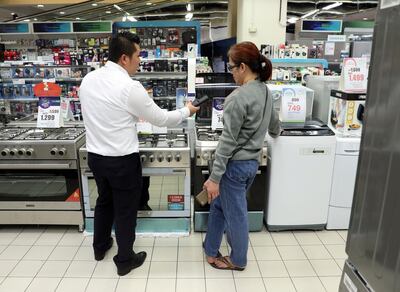With less than 48 hours to go before the UAE imposes a five per cent value added tax (VAT) on goods and services, retailers say they have noticed an uptick in business as shoppers capitalize on VAT-free prices.
“Definitely, customers are more,” said Mathew Thomas, 43, an Indian sales clerk at an appliances store in Abu Dhabi. “They are thinking after January 1, VAT will add another five percent. Whatever they can get right now, they are stocking up.”
The UAE and Saudi Arabia will be the first two GCC countries to begin collecting VAT as a means of raising income alternative from oil revenues to pay for public services, such as roads, public schools, parks, waste control and public safety. Earlier this year, both countries also introduced an excise tax, which doubled the price of tobacco products and energy drinks, and increased the cost of soda drinks by 50 percent.
Shoppers who spoke with The National on Saturday were mostly in support of the new tax or resigned that, whether they like it or not, they will have to pay up starting Monday.
“It’s the country’s right,” said 28-year-old Reham Bakry, an Egyptian. “They are trying to find another source of income, so this is their right. We have to respect this. Of course, they will give us something in return. They will do something. They will not collect this VAT against nothing, of course, so we are expecting more services.”
In 2017, more than 130 countries imposed an indirect tax, such as VAT or sales tax, according to a KPMG tally. North America charged the lowest average indirect tax, about 5 percent, while Europe collected the most, about 20.1 percent on average, according to the report.
“If you go to the US, anywhere, now they are all asking anyone living in the country to pay,” said Ms Bakry, an events planner who has lived in the UAE for five years. “When I’m visiting anywhere, US, Europe, and if you want to do shopping, they are charging you for VAT and you don’t get anything in return because you’re just a visitor. So, five percent is nothing. It’s a country’s right. It is fine for them to do this.”
Ms Bakry, like most other shoppers surveyed, denied going out of her way to buy items ahead of VAT and said she was just carrying out her regular shopping routine at the Abu Dhabi Mall, as she would have done with or without impending new taxes.
“No, it’s something I’m thinking about,” Ms Bakry said. “Even if they increase the VAT, what I will do? I will buy the same thing.”

Nabil Nasser, a 59-year-old Jordanian who has lived in the UAE more than 20 years, said he didn’t expect most shoppers to be out panic-buying because the new VAT would not be so damaging to the pocketbook.
“I don’t see it as having a big impact on the prices in general because already the prices are competitive before the VAT,” said Mr Nasser, who works for the engineering department of an insurance company, and was picking up small items at a grocery store. “I mean, if you are a smart shopper, you always look for the best offer between all the supermarket chains.”
If anything, the new taxes would force consumers to become even more savvy with their budget and spending, he said.
“I look at it this way, if you spend Dh10,000 a month on average, five percent is Dh500. It’s so easy, you can cut one dinner outside in a five-star hotel. So, one dinner, if you skip one dinner, it’s already done. So, [for] couples, Dh500, that’s it,” said Mr Nasser. “It’s not a big thing. If you make a small adjustment on your spending, this five percent is not a big deal, this is the way I look at it.”
Compared to what other countries charge in indirect taxes, the VAT proposed by the UAE is “peanuts”, said Mr Nasser.
But for low or middle-income earners, the additional cost would not be so painless, said Filipina Angie Pastilloso.
“All the products, all the prices have VAT, so, it’s not only for one product that you are going to pay for the VAT, all the items you are going to pay for the VAT,” said Ms Pastilloso, 30, who was buying grocery items for her New Year’s Eve celebrations. “Your salary is still the same. That is the big problem but then all the products, all the items are increasing.”
Basil Musa, 34, an American who has lived in the UAE for nearly half of his life, said even with the new tax, the Emirates is still a more attractive option for him and other expats.
“To be honest, I’m happy here,” said Mr Musa, who was shopping for grocery necessities. “I like investing my money here. It’s safe and everything is fine. We are happy. I love this country. If you are comparing the expenses of the United States and here, here it will be better for me.”






